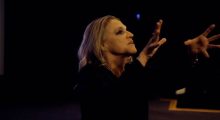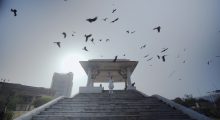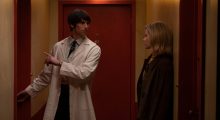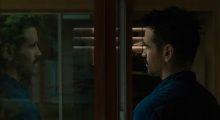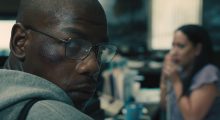Cinematographers
Interviews - Cinematographers
-
“Everyone Has a Unique Perspective on the World”: DP Shana Hagan on Brainwashed: Sex-Camera-Power

Based on her own cinematic talk, Nina Menkes’ Brainwashed: Sex-Camera-Power uses interviews, footage of her talk, and clips from over 175 films to help illustrate how sexual assault and employment discrimination are inscribed in the visual language of cinema. Below, cinematographer Shana Hagan discusses the challenges in adequately capturing the talk on camera, the importance of color grading, and the joys of working with so many women on set. Filmmaker: How and why did you wind up being the cinematographer of your film? What were the factors and attributes that led to your being hired for this job? Hagan: I was introduced […]
-
“In Every Situation We Were There as Persons—Persons That Happened to Have Cameras With Us”: DPs Love Martinsen & Maria Loohufvud on Calendar Girls

Calendar Girls takes its name from its subject, a Florida dance troupe consisting of women over 60 who perform at animal rescue center benefits, church fundraisers and local parades with unbounded and contagious enthusiasm. Below, Love Martinsen and Maria Loohufvud discuss how their intent in capturing the troupe informed their approach and how they managed to make the film on a shoestring budget. Filmmaker: How and why did you wind up being the cinematographer of your film? What were the factors and attributes that led to your being hired for this job? Loohufvid & Martinsen: This film is all about DIY. […]
-
“I Never Say ‘No, We Cannot Do It’ to My Director”: DP Sviatoslav Bulakovskyi on Klondike

In July 2014, during the Donbas War, Malaysia Airlines Flight 17 was shot down over the Donetsk region of Ukraine, a pair of expectant parents living in the disputed Donetsk region of Ukraine by pro-Russian rebels. This is the backdrop for Maryna Er Gorbach’s Klondike, which follows a pair of expectant parents to find their hopes of raising a child in relative piece dashed by the differing loyalties of her brother and his friends. Cinematographer Sviatoslav Bulakovskyi explained how he scouted locations during a COVID lockdown and how his experience taught him to always prepare for the unexpected. Filmmaker: How and […]
-
“We Were Always Searching for the Beauty of Coexistence, Even in the Most Polluted of Places”: DP Ben Bernhard on All That Breathes

With All That Breathes, Shaunak San sought to position humans as a part of the natural world, akin to rather than separate from the birds overhead. The documentary follows a pair of brothers who care for the black kites that fall out of the Delhi skies due to pollution and features cinematography by Ben Bernhard, who has worked extensively with Victor Kossakovsky (Gunda). Below, Bernhard reveals the challenges of tethering images of the natural world to urban living and how he composed shots that place nature and mankind on a level playing field. Filmmaker: How and why did you wind […]
-
“It Was Important to Me That VR Felt Like a Euphoric and Cozy Place to Be”: DP Joe Hunting on We Met in Virtual Reality

We Met in Virtual Reality is a documentary shot, as the name suggests, within virtual reality. Director Joe Hunting trains his camera on a range of activities, including pool games, dances and educational classes to tell the stories of a number of couples who met in VR during the COVID-19 lockdown. Hunting, who directed, edited, and shot the film, spoke about his challenges and goals as cinematographer. Filmmaker: How and why did you wind up being the cinematographer of your film? What were the factors and attributes that led to your being hired for this job? Hunting: I was a self […]
-
“Restrictions Sometimes Bring to Life Really Great Shots”: DP Greta Zozula on Call Jane

In Phyllis Nagy’s directorial debut Call Jane, Joy’s pregnancy leads to a life-threatening condition. When the medical establishment refuses to help, Joy turns to a clandestine organization called the “Janes” that is based on the real-life Jane Collective. The period piece is heavy on sequence shots, which both posed challenges and enabled the creativity of DP Greta Zozula, who discusses the film below. Filmmaker: How and why did you wind up being the cinematographer of your film? Zozula: I was introduced to Phyllis in the early part of last year. The subject matter was important and I was drawn to the […]
-
“We Find the Authenticity of Real Locations to Be Such a Huge Factor in Making a Believable and Captivating Movie”: DP Benjamin Kirk on Watcher

Shot on both vacant streets and luxury apartments in Bucharest, Watcher examines a woman uncertain whether to trust her instincts as she begins to suspect that someone—possibly a neighbor—is stalking her. As DP Benjamin Kirk explains, the camera embodies the state of mind of Julia, heightening the audience’s sense of peril, and films by David Fincher and Roman Polanski were touchstones for both Kirk and director Chloe Okuno. Filmmaker: How and why did you wind up being the cinematographer of your film? What were the factors and attributes that led to your being hired for this job? Kirk: Director Chloe Okuno and […]
-
“You Have to Become Vulnerable With Your Director Before You Can Go On Set”: DP Benjamin Loeb on After Yang

Like Columbus before it, Kogonada’s After Yang tackles its heady subject matter—including, in this case, a climate catastrophe and existential questions about the nature of humanity and memory that arise from its sci-fi setting—only obliquely, through composition and framing. Cinematographer Benjamin Loeb explained the significance of emptiness and space to cinema and the love he and Kogonada share for Ozu. Filmmaker: How and why did you wind up being the cinematographer of your film? What were the factors and attributes that led to your being hired for this job? Loeb: Honestly, I believe I was the unicorn of the interviews and came in very […]
-
“One of the Thrills of Shooting Horror Is You Can Get Quite Expressionistic With Color and Pattern”: DP Charlotte Hornsby on Master

In Master, a student at the fictional Ancaster College, situated on land once used for gallows poles during the Salem witch trials, begins to suspect that the school is haunted and gradually uncovers the secrets behind its progressive veneer. Although the film is loaded with social critique, it operates as a horror film, which allowed cinematographer Charlotte Hornsby room to comfortably deviate from realism in crafting the film’s look. Below, she discusses the influence of filmmakers like Ingmar Bergman and Joanna Hogg and how the film’s aesthetic changes as the narrative unravels. Filmmaker: How and why did you wind up being […]
-
“Shooting Digitally Means Not Having to Play It Safe”: DP Doug Emmett on 892

In 892, the debut film by Aby Damaris Corbin, a desperate former US Marine, driven nearly to homelessness by lack of resources and a stifling bureaucracy, decides to take hostages at a bank—but not because he wants money. What he wants instead is for people to hear his story and acknowledge what he has been through. Much of the film takes place in a single location where artificial lighting was not possible; cinematographer Doug Emmett explains how he was able to overcome these challenges and give the film a realistic and consistent look. Filmmaker: How and why did you wind up […]
